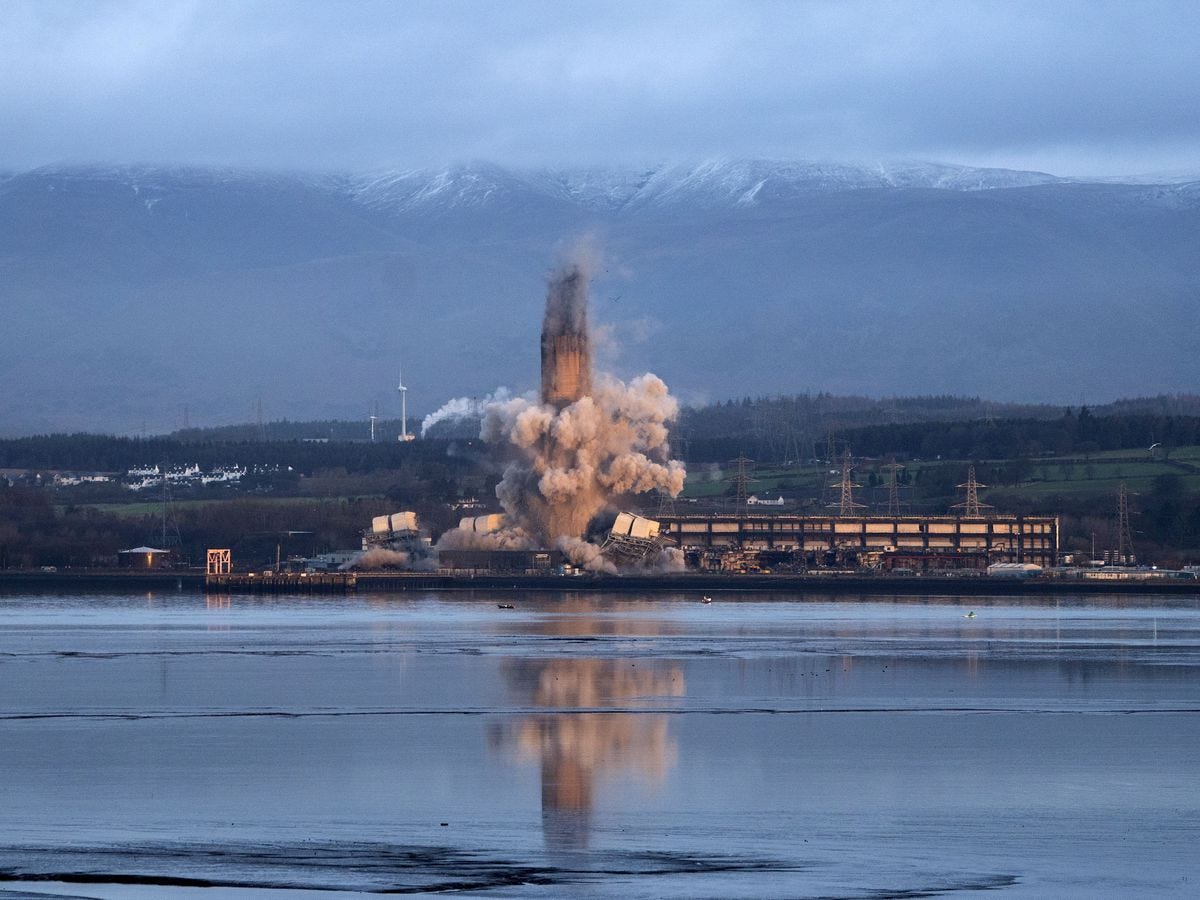Five lessons about Net Zero
What trying to travel without fossil fuel teaches us about Net Zero.
THIS WEEK I read about two “eco-adventurers” who embarked last year on a crossing of the North Atlantic in an electrified yacht. They replaced its reliable diesel engine with wind and solar generators, and batteries. “We’re doing everything we can to show that you can travel without burning fossil fuels”, said one of the crew, a poet, musician and reiki healer.1
They died.
I’m a sailor, and sailing is hazardous. The purpose of this week’s essay is not to mock the crew, whose deaths are as tragic as their efforts were misguided. But their eco-adventure, as an analogy of Britain’s misguided eco-adventure to do everything it can to show that you can power an advanced industrial economy without burning fossil fuels, has valuable lessons to offer.
Here are five we can learn from it.
Nature is deadly
Sailing is one of those activities in which everything is lovely, until it’s not. And then nature hands you the unsentimental reminder that it will kill you in a heartbeat unless you take very great care to prevent it from doing so.
Thomas Hobbes, living in a time when energy levels were similar to “Net Zero” conditions, describes what life was like in the resulting constant competition for scarce resources2:
"…the time wherein men live without other security than what their own strength and their own invention shall furnish them withal. In such condition there is no place for industry, because the fruit thereof is uncertain: and consequently no culture of the earth; no navigation, nor use of the commodities that may be imported by sea; no commodious building; no instruments of moving and removing such things as require much force; no knowledge of the face of the earth; no account of time; no arts; no letters; no society; and which is worst of all, continual fear, and danger of violent death; and the life of man, solitary, poor, nasty, brutish, and short."
Life with abundant, affordable energy is lovely. Without it, it’s solitary, poor, nasty, brutish, and short. Billions live in constant competition for scarce resources, and die in their millions each year from cold, hunger, disease, and violence. Nature is deadly. A properly equipped yacht protects its crew from it. Here in Britain, our prolific energy resources have protected us from it.3 Abandoning that protection is reckless, and we do so at our peril.
Complacency kills
The article records the crew as experienced. It’s difficult to imagine how someone who has experienced a storm or equipment failure for which survival depends on a reliable engine would undertake the extremely dangerous experiment of replacing it with a toy.
Very few of us in Britain have experienced life threatening energy shortages. All of our lives, we’ve gone to bed each night and risen each morning under the blanket of protection afforded by a continuously expanding energy supply. Most of us are no more aware of that protection than is a fish aware of water, because a fish has never experienced water’s absence.
It’s that protection that has allowed a “Just Stop Oil” protestor to live long enough to set off in the morning for a spot of leisurely interruption of fire, ambulance, and police emergency services. She survived her seventy winters with heating obtained from hydrocarbon. 50% of the protein and carbohydrate in her taste-the-difference bircher muesli and nut medley compôte was obtained from hydrocarbon. She avoided cholera by flushing away her morning bowel motion and washing her hands in hot, clean water with waste and water systems powered by hydrocarbon. During the day, she’ll demand that oil is replaced by wind turbines with carbon fibre blades made from hydrocarbon, manufactured by a system powered by hydrocarbon. She’ll avoid being killed on the way home by travelling over streets lit by energy from hydrocarbon. At bed time, she’ll take a tranquilliser made from hydrocarbon to help her manage her fear of slightly milder weather.
She is profoundly complacent. It is her complacency that causes her to demand the extremely dangerous, experimental replacement of our energy system. A replacement that will kill her.
Know what you’re doing
Sailing does not lend itself to guesswork, any more than it lends itself to crossing your fingers and hoping that it will be alright. Neither do our energy arrangements.
David Turver, over on his excellent energy substack “Eigenvalues”, catalogues the scale of ignorance and incompetence at every level of the British government and civil service in this area. It is unsafe to assume that they know what they are doing — they don’t. So we must educate ourselves. That’s partly why I write this substack, so that I can make a contribution to that effort.
Before you pointed a boat at New York, you’d want to learn everything you could about how to get there safely. So it is with our energy system. Learn everything you can about it — how it works, how it can fail, the consequences of that failure, and what sensible energy policy looks like. And then, armed with your knowledge, hold them accountable and reject their ideologies.
For most of your life, you’ve never had to. For the rest of your life, you do.
Prepare for the worst
A yacht near the shore is always one snapped rudder linkage away from disaster. In recreational sailing, you hope for the best, but you plan for the worst. You sail downwind from rocks, you maintain escape routes, you inspect and maintain your equipment, you cary spares.
That lesson means that you don’t plan your country’s energy system for when the temperatures are pleasant, the sun is shining, the wind is blowing moderately, and your neighbours are well disposed toward you and inclined to sell you their current surplus energy.
You plan it for 6 weeks of “Beast from the East” baltic temperatures, a synoptic high pressure system causing breathless wind conditions over the entire European continent for weeks, and the recognition that our neighbours sell energy to us because it profits them to, and that they will stop doing so the minute they lack sufficient quantities for their own citizens.
By the way, you might want to enquire after reading this how much it would cost in batteries to store enough electricity to run the UK for six months (the average length of the annual British wind drought). We’ll look at that together in a future essay.
Have a good engine, and make sure it works
I’ve singled this one out for last, because it is so fundamental — to sailing, and to industrial economies. In sailing, the wind is for the fun stuff. The engine is what keeps us out of danger, and gets us out of danger.
So it is with an industrial economy. Our heating system, our food system, our sanitation system, our health system, our security and law enforcement system, our manufacturing system, and countless other systems are not “fun stuff”. They have to be there - 24 hours a day, 7 days a week, 365 days a year, year after year after year. We will die if they are not. Millions do, every year.
We need a good engine — a high gradient, properly maintained, nuclear and hydrocarbon fuelled power generation system. Anything else is reckless misadventure.

Net Zero will impoverish us and our children. We must say “No to Net Zero”. Please consider sharing this news letter with your friends.
Sawer, P. and Coen, S. (2024) ‘British eco-adventurer found dead with husband in lifeboat off Canadian coast’, The Telegraph, 20 July. Available at: https://www.telegraph.co.uk/news/2024/07/20/british-eco-adventurer-dead-husband-lifeboat-canadian-coast/ (Accessed: 6 August 2024).
Hobbes, Thomas. Leviathan. Edited by C. B. Macpherson, Penguin Books, 1985.
Not all of us. Even before Net Zero starts to bite, 26,000 already die every winter in Britain from the effects of cold. More in a future essay.



Another great post. The analogy of the electrified yacht leading to disaster is very telling.
“Net Zero will impoverish us and our children”. I infer that your message is that Net Zero is more than just a pointless vehicle of impoverishment (the UK contributes just 1% of global emissions and atmospheric CO2 has negligible impact on climate as its global warming effect is already saturated), it is a crime against humanity. I hope Ed Miliband reads this, and his Tory predecessors.
Would the weight of the battery help to sink a yacht faster? I recall reading about that fatal experiment and thinking why they decided to do it. Centuries ago crossing the Atlantic ( Marco Polo, rounding Cape of Good Hope ( Vasco da Gama), was done in sizeable wooden ships with a variety of sails for different wind conditions.
The likes of Ed 'net zero' Millibacon wouldn't have set foot in that yacht- he would be as far removed from it as he will be from the effects of his maniacal agenda for the UK to be mostly powered by wind and sun. But, he and that yacht crew must share the same mindset.... stubborn and unreasonable. There are too many like Milliband populating the government and NGOs with those characteristics, charting the economy and society on to the rocks.
There will have to be huge battery storage facilities around the UK, more pylons, more turbines, more solar panels.....but not where 'they' live. It's frustrating that these people never accept the consequences of their zealotry, their 'righteousness', they always say they had the best intentions, worked with the 'knowledge' they had 'at the time' ( Blair and his WMDs) and they go on to 'destruction' elsewhere.
Milliband and the CCC are deliberately and wilfully sidelining any contrary opinion as he/it pushes the UK to moribund status for energy production and all things dependent on it.